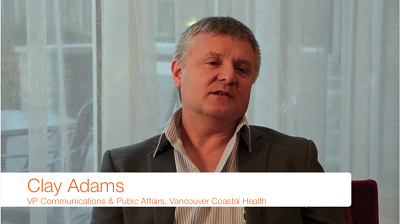 As a seasoned spokesperson in the healthcare industry in Canada, Clay Adams, ABC strategically applies the rules he learned as a journalist in Australia. While I was speaking at an internal communications conference in Calgary, I set-up a ‘Comms Crusader’ video interview with Clay because he’s a consummate professional in dolling out advice using humorous stories that you’ll remember.
As a seasoned spokesperson in the healthcare industry in Canada, Clay Adams, ABC strategically applies the rules he learned as a journalist in Australia. While I was speaking at an internal communications conference in Calgary, I set-up a ‘Comms Crusader’ video interview with Clay because he’s a consummate professional in dolling out advice using humorous stories that you’ll remember.
In this four minute video, Clay answers three questions:
- How important are key messages in the media interview?
- How do you select the perfect spokesperson?
- What ‘one thing’ should every spokesperson keep top of mind?
Importance of Key Messages
Key messages are important, but they need to used in context of the interview. Clay highlights the fact that sometimes spokespeople get so caught-up in their key messages they don’t answer the actual question. And from watching many politicians dodge questions on the news and YouTube, you and I both know that this type of approach does not build trust or credibility with your audience. The end game is about ensuring the audience or journalist receives the information they need, not just your key messages.
A colleague, Eric Bergman, ABC, APR, MC shares a similar rule in his Pause-Answer-Stop approach. Eric states spokespeople should stop to think, answer the question and then simply stop talking.
Selecting your spokesperson
The critical factor Clay cites for selecting a good spokesperson is not only subject matter knowledge, but being able to deliver the communication effectively. A spokesperson should not only be a content expert, but someone who can effectively answer and communicate broader questions as well. Clay sees corporate communicators as a great example of spokespeople who can talk to specific content, but can also understand the bigger organizational picture and know what to say and how to say it.
The ‘one thing’ spokespeople need to remember!
In his typical self-deprecating way, Clay highlights this answer with a personal story. I’ll leave this important rule up to Clay to share in the video!
If you have other tips for spokespeople on how to effectively use key messages feel free to share them in the comments below!

 connecting
connecting




Great principles Cyrus. If you want to dig deeper into the world of issues management and crisis communication, I found Jeff Ansell’s book, “When the Headline is You” to be an excellent resource. He presents a Value Compass you can use to provide honest, meaningful responses to present you and your organization in a positive way.
Thanks for the note Monica. And yes, I totally agree that Jeff provides great advice.
First off I want to say fantastic blog! I had
a quick question in which I’d like to ask if you do not mind.
I was curious to know how you center yourself and clear your thoughts before writing.
I have had trouble clearing my mind in getting my
ideas out. I do enjoy writing but it just
seems like the first 10 to 15 minutes are usually lost simply just trying to figure
out how to begin. Any recommendations or hints? Thank you!
Glad you enjoy the content.
As for getting into the writing groove, I find eliminating distractions like email and texts is a good first start. Shut down everything but your word processor/application.
Instead of trying to write entire sentences right away you may want to try simply making bullet points of your ideas and then once you’re happy with the direction, then fill them out into full sentences…one small step at a time.
Hope this helps!